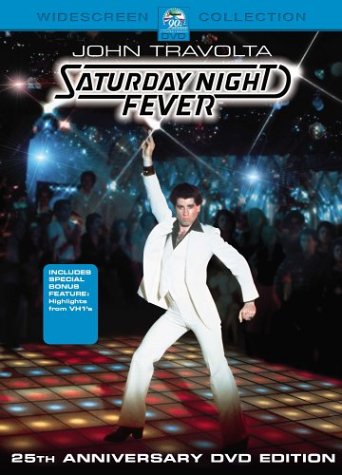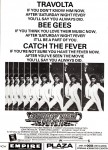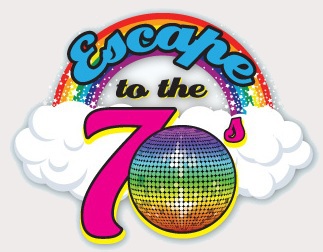Saturday Night Fever – 1977
Where do you go when the record is over…
 Director
Director
John Badham
Writer
Nik Cohn (magazine article Tribal Rites of the New Saturday Night)
Norman Wexler (screenplay)
Producer
Milt Felsen associate producer
Kevin McCormick executive producer
Robert Stigwood producer
Cast
John Travolta – Tony Manero
Karen Lynn Gorney – Stephanie
Barry Miller – Bobby C.
Joseph Cali – Joey
Paul Pape – Double J.
Donna Pescow – Annette
Bruce Ornstein – Gus
Julie Bovasso – Flo Manero
Martin Shakar – Frank Manero Jr.
Sam Coppola – Fusco (as Sam J. Coppola)
Nina Hansen – Grandmother
Lisa Peluso – Linda
Denny Dillon – Doreen
Bert Michaels – Pete
Robert Costanzo – Paint Store Customer (as Robert Costanza)
Robert Weil – Becker
Shelly Batt – Girl in Disco
Fran Drescher – Connie
Donald Gantry – Jay Langhart
Murray Moston – Haberdashery Salesman
William Andrews – Detective
Ann Travolta – Pizza Girl
Helen Travolta – Lady in paint store
Ellen March – Bartender
Monti Rock III – The Deejay
Val Bisoglio – Frank Manero Sr.
Roy Cheverie – The Wrong Partner (uncredited)
Adrienne King – Dancer (uncredited)
Alberto Vasquez – Gang Member (uncredited
Review by Bill Slocum
The Gospel According To Barry, Robin, Maurice & John
“I got the wings of heaven on my shoes/I’m a dancin’ man, and I just can’t lose…” More people know “Saturday Night Fever” for its soundtrack than the movie. Having been one of them, I can speak to how that can skew things negatively seeing the film for the first time. The music of “Saturday Night Fever” is shimmering, accessible disco music of high sophistication, an aural cocoon of positive vibes. The movie, by contrast, is harsh, nasty, vulgar, and dark.
 Tony Manero, a kid of good instincts but mediocre intelligence, lives a life of quiet desperation, hanging around his low-life buddies and trolling after sex and various illicit thrills. He blows his small weekly wages for a brief spark of the divine, music that makes him a god, or at least an idol, to the others who come to his temple. “Can I wipe your forehead?” a woman asks, and as she does so it reminds one a little of Mary Magdalene washing Christ’s feet.
Tony Manero, a kid of good instincts but mediocre intelligence, lives a life of quiet desperation, hanging around his low-life buddies and trolling after sex and various illicit thrills. He blows his small weekly wages for a brief spark of the divine, music that makes him a god, or at least an idol, to the others who come to his temple. “Can I wipe your forehead?” a woman asks, and as she does so it reminds one a little of Mary Magdalene washing Christ’s feet.
Calling “Saturday Night Fever” a religious film feels like a stretch. If anything, the attitude of the film is fairly atheistic, especially in the way it mocks the piety of Tony’s mother and showcases the fall of his brother the priest. Yet “Saturday Night Fever” is completely concerned with the question of transcendence, man’s desire to achieve it and his inability to do so, using the grimy streets of Brooklyn as the reality and the music of the Bee Gees and other artists as the fantasy. The result is a cultural touchstone.
The music may be the best part of the film, but it works in unison with the narrative, right from the opening when a God’s-eye view of Brooklyn descending from the clouds to the train tracks suddenly picks up “Staying Alive” in midbeat. When we first see Tony, in a brilliant sequence that merely involves him toting a paint can, the song’s lyrics are already telling us his sad story, that this tough, chiseled character is struggling to stay alive, “going nowhere” in a big city with no one to help him. Barry, Robin, and Maurice Gibb almost merit co-screen writing credit, as they set a mood director John Badham and writer Norman Wexler excellently pursue.
People who complain the film is foul have a point; the soundtrack you here on the radio does nothing to prepare you for the language, casual sex, and racism presented matter-of-factly on screen. To me, it points again to the question of religion, and what people have if they don’t have God. The answer, it seems, is music, and nothing else. It’s either one of the most nihilistic or pro-religious messages ever put on screen. The fact I have no idea which it is makes it more interesting.
Another reason the film is so very good is John Travolta’s breakout performance in the lead role. People talk about his dancing, and he’s amazing especially when the floor opens up and lets him do a solo turn to “You Should Be Dancing.” But his best dancing comes during he’s acting. One moment his character is nobly refusing a prize he knows he didn’t deserve. The next, he’s assaulting a woman because he knows she doesn’t want to have sex with him. Travolta’s dark undercurrents make such transitions not only believable but essential to the story.
I’m not completely sold on “Saturday Night Fever.” The family scenes are annoyingly one-dimensional, for example. Like another bleak, pathbreaking film featuring a gang of toughs, “The Wild Bunch,” it’s a film I respect more than enjoy.
But there’s a lot of color and depth here. Those who say otherwise aren’t watching it with both eyes open. I also love the performance of Karen Lynn Gorney, who provides pathos and humor as Travolta’s dance partner Stephanie whose aspirations of glory exceed even his, even if she can’t pronounce words like “interesting.” The scene of the two of them in the coffee shop is hilarious.
A lot of the film isn’t, though. It’s quite bleak. But that’s the strange source of its power, that and the music. Like its protagonist, “Saturday Night Fever” is a film that doesn’t stand still.
Review by Jack Gattanella
Saturday Night Fever (1977)
It has it’s moments of absolute glory,
Saturday Night Fever is thoughtful, engaging, and sometimes brilliant. While some might call it one of the greatest films ever, I must disagree. But along the lines of a groundbreaker, yes it is. The film does for disco what Suburbia did for punk. And the film gives John Travolta, the cool Italian guy from Engelwood, NJ a good break. He plays a paint guy who at nights (and sometimes days) has a love for dancing, which he is absolutely excellent at (those dance scenes are quite memorable). Not always on the money, but when it is, it delivers the goods.
Bee Gees provide songs here that everybody likes (I would have to assume from Wayne Campbell’s statement in Wayne’s World). A-






Have Your Say.....
If you have any information or thoughts on this page, please help us by popping them in the comment box below.